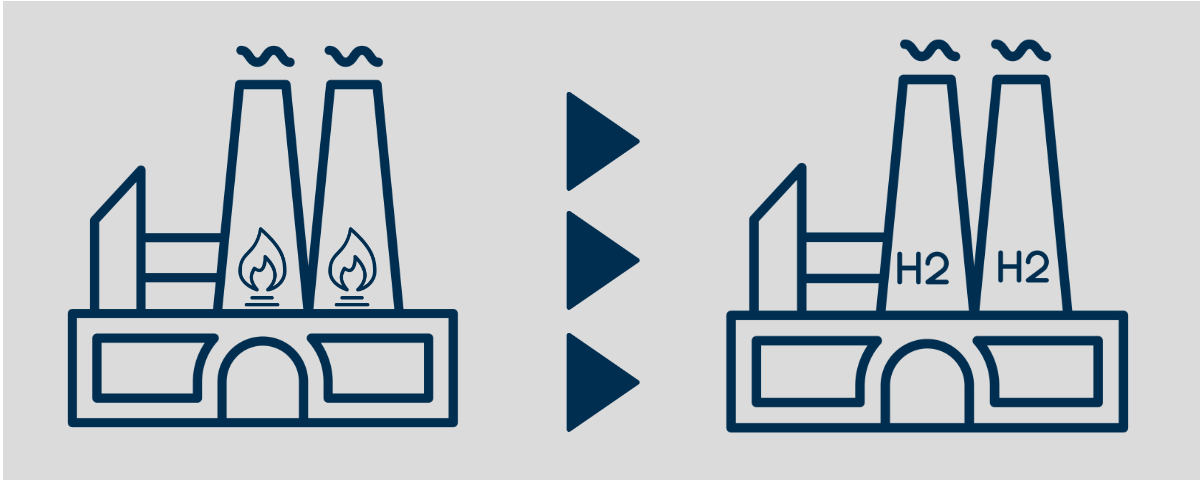
Shaping the energy transition: Impressions from the EnergySystemTransition Conference 2023
21. November 2023
WP-Flex: Analysis of the grid effects of increased flexibility of heat pumps through higher output and heat storage capacity
4. December 2023November 30, 2023 | Hydrogen (H2) plays an important role in the renewable energy system to secure electricity generation. New and existing power plants must therefore be made ready for H2 operation. They should become H2-ready. However, the conversion and new construction of power plants that can be operated with 100 per cent hydrogen poses challenges. In addition, H2 readiness is not yet clearly defined in regulatory terms. These are the findings of scientists at the Reiner Lemoine Institute (RLI). In a recent study, they show what H2 readiness for gas-fired power plants means in technical terms, what measures are necessary for a conversion, what costs are incurred and which legal provisions need to be adapted. In 14 key statements, they formulate proposals for the climate-friendly use of H2 in power generation. The European Climate Foundation sponsored the study.
In the future, hydrogen power plants will provide energy when electricity from renewable energies is not available for a longer period of time. However, gas turbines for 100 per cent hydrogen use in larger power plants are not yet commercially available. So-called H2-ready power plants are intended to contribute to the solution. In its “Framework for the Power Plant Strategy”, the German Federal Ministry for Economic Affairs and Climate Protection has announced that it will promote these – with a tender volume of ten gigawatts (GW) in the period from 2024 to 2026 and a further five GW for new or existing gas-fired power plants thereafter. They are to be operated with natural gas and later with green hydrogen. These power plants must be completely converted to run on hydrogen by 2035 at the latest.
Lack of legal definition of H2-Ready makes implementation difficult
As the study shows, there is currently no legally established definition of what H2-ready means for power plants. This makes the planning of such plants more difficult. A clearly defined concept of H2 readiness can provide a reliable framework for the realisation of emission-free H2 power plants. Germany has so far only introduced an implicit definition in the Combined Heat and Power Act (KWKG). It states that the transition to 100 per cent hydrogen use must be achievable for less than ten per cent of the power plant’s original investment costs. The definition should ensure that the actual reduction in emissions takes centre stage.
“A blanket, cost share-based definition of H2 readiness, as in the KWKG, favours investments in more capital-intensive combined-cycle gas and steam power plants (CCGT). These are more efficient, but often run for many hours a year, especially as CHP plants. Many operating hours mean a high demand for hydrogen. This is problematic as renewable hydrogen will be in short supply. Typical peak-load power plants with only a few full-load hours are usually gas turbine power plants (GT). With the cost-related criterion of ten per cent in the H2-ready definition, these would probably hardly be eligible for funding,” says Andreas Christidis, project manager of the study at RLI.
Conversion from H2-Ready to H2 means time and cost expenditure
The scientists came to the conclusion that the most extensive retrofitting measures relate to the fuel gas and gas turbine system. The costs for this are likely to be less than ten per cent of the initial investment for larger combined cycle power plants. They are likely to be significantly higher for GT power plants. The need to convert H2-ready power plants to hydrogen operation will also be comparatively high in a short time frame and the capacities of manufacturers will be limited. Power plant operators should therefore plan for the conversion today and take into account factors such as the space required for new components. The German government must also set a binding deadline for the conversion in order to avoid further emissions.
No emission-free H2 power plant without green hydrogen
The use of renewable, i.e. green hydrogen is crucial for the decarbonisation of electricity generation. “If fossil hydrogen is used, such as blue hydrogen from natural gas, the emissions of H2 power plants are similar to those of today’s natural gas power plants,” says Anne Wasike-Schalling, research associate at RLI and responsible for the topic of hydrogen in the research area of mobility with renewable energies. A 400 MW power plant requires over 700 MWh of hydrogen per hour – the equivalent of twelve large H2 lorry trailers. “We therefore need the necessary quantities of green hydrogen if decarbonisation is to be successful. This is both a necessary condition and a challenge,” says Wasike-Schalling. “Connecting the H2 power plants to the hydrogen core network and supplying it with green hydrogen are essential.”
The scientists also come to the conclusion that the required capacities of H2 power plants are not a fixed value and that the German government must consider further measures to stabilise the energy system. In a policy briefing, they formulate 14 core statements with proposals for the climate-friendly use of H2 in power generation.
Further information:
Study & Policy Brief
Supplementary short report “Thermal power plants in the energy system of the future” (only in German)
More about the project
Press contact RLI
Timo Beyer
Communications
Phone: +49 30 12084 3415
E-mail: presse@rl-institut.de
Project management RLI
Andreas Christidis
Researcher
Research Unit Mobility with Renewable Energy
E-mail: Andreas.Christidis@rl-institut.de
Anne Wasike-Schalling
Researcher and Topic Area Manager for Hydrogen
Research Unit Mobility with Renewable Energy
E-mail: Anne.Wasike@rl-institut.de





